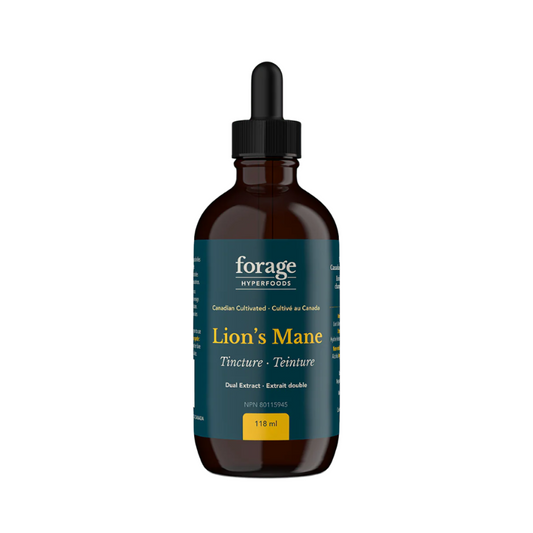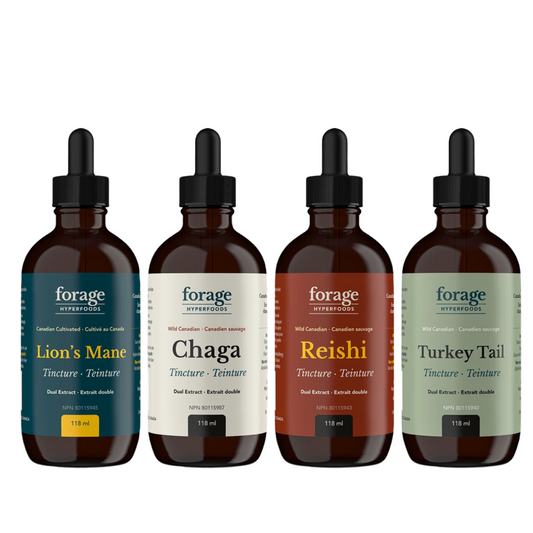
Using Chaga for Cancer: Here’s What We Know
Share
People have been using Chaga mushroom for centuries as a medicine for various health conditions, including cancer. But what does the research say? Can Chaga cure cancer or affect its progression? Today, we’re going to dig into what the research says about using Chaga for cancer, but before we do, let’s quickly discuss what Chaga actually is.
What is Chaga?
Although it’s typically referred to as a mushroom, Chaga (Inonotus obliquus) is actually a sclerotia—a hardened mass of fungal mycelium. A parasitic fungus, Chaga primarily grows on birch trees in cold climates, like those in Canada, Siberia, Scandinavia, and some parts of the United States.
Chaga doesn’t pop up from the forest floor like most mushrooms. Rather, Chaga appears on birch trees as a black, charcoal-like mass (called a conk) with a woody, orange interior. Despite its unsightly exterior, the wide-ranging health benefits of Chaga more than make up for its lack of aesthetic beauty. Chaga is packed with antioxidants, vitamins, and minerals, making it a functional fungi powerhouse. It’s been shown to support a strong immune system, provide anti-inflammatory benefits, support heart health, promote good digestion, and potentially play a role in cancer prevention, just to name a few. You can learn about Chaga benefits in more detail in this blog post. One interesting theory is that Chaga’s many beneficial compounds may be a result of natural adaptations by the fungus to withstand the cold, harsh climate it grows in.
What does the research say about using Chaga for cancer?
First things first, it’s important to note that Chaga has only been studied on cell lines and animal models. There have been no human studies to date. That being said, the available research is quite encouraging. Several animal and test-tube studies have shown that Chaga can prevent and slow cancer growth. Here are some notable studies:
- In a 2008 test-tube study, Chaga extract prevented the growth of cancer in human liver cells.
- A 2009 study found that triterpenes, a compound found in Chaga, cause tumor cells to self-destruct. Unlike other cancer treatments, however, Chaga does not appear to harm healthy cells.
- A 2010 study found that Chaga slowed the growth of lung, breast, and cervical cancer cells in a petri dish. The same study found that Chaga could slow the growth of tumors in mice.
- A 2015 test-tube study involving human colon cancer cells found that an alcohol extract of Chaga inhibited cell cycle progression of the cancer cells.
- In a 2016 study of mice with cancer, Chaga supplements resulted in a 60 percent reduction in tumor size.
- A series of test-tube studies in 2018 involving lung cancer cells showed that an alcohol extract of Chaga triggered apoptosis (programmed cell death) in all cell lines.
So, what’s the verdict? Can Chaga cure cancer?
It’s postulated that the anticancer effect of Chaga is partly due to its high content of antioxidants, which protect cells from damage by free radicals. In particular, Chaga contains the triterpenes with antioxidant properties. Test tube studies have shown that very concentrated triterpene extract can help kill cancer cells.
Amazingly, the above studies are only a small sampling of the available research on the subject. Although the results are promising, we certainly cannot say that Chaga can cure cancer at this point in time. Researchers will need to conduct extensive studies in humans to reach more definite conclusions about Chaga’s anticancer potential.
Potential side effects and interactions to be aware of
If you’re interested in trying Chaga as part of your cancer treatment, be sure to get your doctor’s permission before doing so. It may not be advisable to consume Chaga if:
- You are taking blood-thinning medications, such as Warfarin.
- You are taking diabetic medications.
- You have kidney disease.
Find a trusted source for your Chaga
Purchasing Chaga mushroom from a trusted supplier is the best way to ensure its effectiveness and safety. Not all Chaga products are created equal so be sure you’re getting yours from a company whose Chaga is organically grown, sustainably harvested, carefully extracted, and tested for quality and contaminants, such as heavy metals, pesticides, microbial contamination, and gluten. If a Chaga supplement lists any ingredients like “mycelium on grain” or other funky fillers, it's best to avoid it. To reap the full potential of this fungal powerhouse, seek a Chaga extract that uses wild-harvested Chaga.
The bottom line
Based on test-tube and animal studies, Chaga shows encouraging potential in treating or slowing the progression of cancer, however, large-scale human studies are needed to draw more concrete conclusions. While waiting for human studies to be conducted, we can be hopeful about the encouraging research available today.
All referenced sources are linked in the blog.



